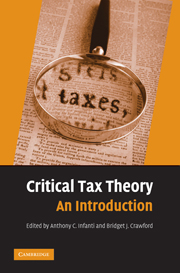Book contents
- Frontmatter
- Contents
- List of Illustrations
- List of Tables
- List of Contributors
- List of Common Abbreviations
- Introduction
- CHAPTER 1 FOUNDATIONS OF CRITICAL TAX THEORY
- CHAPTER 2 HISTORICAL PERSPECTIVES ON TAXATION
- CHAPTER 3 THE GOALS OF TAX POLICY
- CHAPTER 4 CRITICAL TAX THEORY MEETS PRACTICE
- CHAPTER 5 RACE AND TAXATION
- CHAPTER 6 GENDER AND TAXATION
- CHAPTER 7 SEXUAL ORIENTATION AND TAXATION
- CHAPTER 8 THE FAMILY AND TAXATION
- CHAPTER 9 CLASS AND TAXATION
- CHAPTER 10 DISABILITY AND TAXATION
- CHAPTER 11 GLOBAL CRITICAL PERSPECTIVES ON TAXATION
- CHAPTER 12 CRITICAL PERSPECTIVES ON CRITICAL TAX THEORY
- Index
CHAPTER 4 - CRITICAL TAX THEORY MEETS PRACTICE
Published online by Cambridge University Press: 04 August 2010
- Frontmatter
- Contents
- List of Illustrations
- List of Tables
- List of Contributors
- List of Common Abbreviations
- Introduction
- CHAPTER 1 FOUNDATIONS OF CRITICAL TAX THEORY
- CHAPTER 2 HISTORICAL PERSPECTIVES ON TAXATION
- CHAPTER 3 THE GOALS OF TAX POLICY
- CHAPTER 4 CRITICAL TAX THEORY MEETS PRACTICE
- CHAPTER 5 RACE AND TAXATION
- CHAPTER 6 GENDER AND TAXATION
- CHAPTER 7 SEXUAL ORIENTATION AND TAXATION
- CHAPTER 8 THE FAMILY AND TAXATION
- CHAPTER 9 CLASS AND TAXATION
- CHAPTER 10 DISABILITY AND TAXATION
- CHAPTER 11 GLOBAL CRITICAL PERSPECTIVES ON TAXATION
- CHAPTER 12 CRITICAL PERSPECTIVES ON CRITICAL TAX THEORY
- Index
Summary
Moving from theory to practice, the articles in this chapter represent applications of critical tax theory to the nuts and bolts of making, interpreting, and working with the law. In the first piece, A Legislator Named Sue: Re-Imagining the Income Tax, Marjorie Kornhauser imagines a tax system designed and implemented by women. She suggests that female legislators would be guided by an “ethic of care” to change the definition of income, modify the tax base, and create new deductions for workforce reentry costs and child-care expenses. Tax expenditures, in Kornhauser's estimation, likely would be favored in a female-designed tax system in order to benefit dependents and families.
Turning to those who interpret the laws, Daniel Schneider undertakes an empirical study in Using the Social Background Model to Explain Who Wins Federal Appellate Tax Decisions: Do Less Traditional Judges Favor the Taxpayer? In his study, Schneider identifies race, gender, educational status, and other social factors as statistically relevant to the outcome of appellate decisions in tax cases. He hypothesizes that some judges' awareness of racial bias in the Code may account for some pro-taxpayer results. Schneider's work also suggests that Marjorie Kornhauser's instincts are correct: women do appear to approach the tax laws differently than men do.
In Tax Protest, “A Homosexual,” and Frivolity: A Deconstructionist Meditation, Anthony Infanti then explores the collision of traditional judges with nontraditional taxpayers. In his essay, Infanti tells the story of Robert Mueller, a gay man who spent more than a decade protesting the discriminatory treatment of gays and lesbians under the Code.
- Type
- Chapter
- Information
- Critical Tax TheoryAn Introduction, pp. 73 - 74Publisher: Cambridge University PressPrint publication year: 2009

